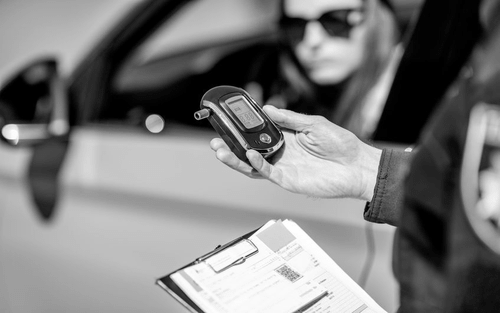Contributor: Adam Justinger
It’s prom night. You’re seventeen years old and about to head into the dance with your date and a few close friends. As you are about to enter the dance, you see your local law enforcement officer waiting outside with a funky looking device. As you approach, he asks if you’re willing to take a breathalyzer. You agree and he tells you to take a deep breath and blow until he tells you to stop. For many, this was probably the first time you have heard of or taken a breathalyzer.
The term “breathalyzer” is often thrown around very loosely in conversations. Generally, the term breathalyzer is brought up when someone has been charged with or convicted of a crime. However, in today’s day and age, even private individuals can obtain a breathalyzer with ease. So, are all breathalyzers the same? The short answer is no. There are several different kinds of breathalyzers.
Preliminary Breath Tests
One type of breathalyzer is known as the preliminary breath test (PBT). A PBT is an on-site breathalyzer that is utilized by law enforcement to determine probable cause to arrest. A PBT is generally administered as a field sobriety test to determine an individual’s blood alcohol concentration (BAC) to support an arrest. However, the results of the PBT are generally inadmissible in DUI/DWI cases in both North Dakota and Minnesota. But, they may be relevant in other cases, such as minor in possession/consumption. One of the reasons the PBT results are generally inadmissible, especially in DUI/DWI cases, is because they are far less reliable than a chemical test.
A PBT is a small handheld device. The PBT requires an officer to place a small mouthpiece into the machine before administering the test. Then, the officer has the individual blow a steady flow of air into the machine until it registers the individual’s BAC. The machine then calculates the BAC results within minutes. In North Dakota, the most common PBT used by law enforcement officers is the Alco-Sensor FST. In Minnesota, there are several different PBT’s that are utilized by law enforcement officers.
Now, the question you have all been wondering, do I have to take the PBT? The answer to that is no. It is not a crime in North Dakota or Minnesota to refuse to take the PBT. However, in North Dakota, you may face certain administrative penalties for refusing to take the PBT if you are being investigated for a DUI and refuse the chemical test. You can read more about that here.
Chemical Breath Tests
Another type of breathalyzer is a chemical breath test. A chemical breath test is supposed to be more accurate than the PBT. In a DUI/DWI case, the chemical breath test results can be admitted at trial to prove an individual’s BAC, so long as certain evidentiary standards are met. However, there are still many different arguments defense attorneys can use to exclude the results of the chemical test or to attack the reliability of the test. The most common chemical device used in North Dakota is the Intoxilyzer 8000. On the other hand, Minnesota generally uses the Datamaster DMT.
A chemical breath testing device is much larger than a PBT and is usually located at a correction center or law enforcement building. Without getting into any of the scientific specifics, the reason that a chemical test is more reliable than a PBT is because the environment is more controlled. The machine uses different cylinders and chambers to purge the air inside of the machine prior to the test. This is in an attempt to avoid any contamination with the individual’s breath sample. To provide a sample, an individual must blow a steady stream of air into a mouthpiece that is connected to a hose. The machine will then calculate the individual’s BAC based on the breath sample.
Unlike the PBT, refusal to take the chemical test is a crime. In North Dakota, if an individual refuses to take a chemical test, they can be charged with a class B misdemeanor for a first offense. In Minnesota, if an individual refuses a chemical test for a first offense DWI (without any aggravating factors) it will increase the charge from a misdemeanor to a gross misdemeanor. Further, if you refuse a chemical test in either North Dakota or Minnesota, you will face more severe administrative penalties as they pertain to your driving privileges.
Ignition Interlock
The last breathalyzer this blog will focus on is an ignition interlock. An ignition interlock is a device that is installed inside your vehicle. The device requires a driver to blow into a handheld breathalyzer in order to start/drive their vehicle. Generally, these types of breathalyzers are required when an individual obtains multiple convictions for DUI/DWI.
Contact SW&L Attorneys
If you are in a situation where a law enforcement officer is requesting you to submit to a breathalyzer, it may be in your best interest to request to contact an attorney prior to submitting to the test. DUI/DWI’s and other criminal matters involving breathalyzers are complex and seeking legal representation may be in your best interest. If you have a criminal issue in North Dakota or Minnesota, please do not hesitate to call Adam Justinger at SW&L Attorneys in Fargo at 701-297-2890.
This article is only meant to provide general information and does not constitute legal advice.










